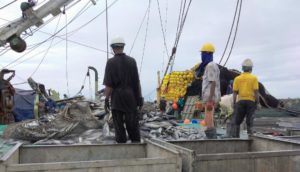Tuna vessels are to observe a fishing moratorium from January 1, 2024
 Ghanaian tuna vessels will, from January 1 to March 13, 2024, join their counterparts globally to observe a fishing moratorium in line with regulations of the International Commission for the Conservation of Atlantic Tunas (ICCAT).
Ghanaian tuna vessels will, from January 1 to March 13, 2024, join their counterparts globally to observe a fishing moratorium in line with regulations of the International Commission for the Conservation of Atlantic Tunas (ICCAT).
Mr Richster Nii Amarh Amarfio, the Executive Director of the Blue Economy and Governance Consult, speaking at a Ghana Ports and Harbours Authority (GPHA) media forum, said the closure of the Atlantic Ocean would only apply to tuna vessels using Fish Aggregating Devices (FAD).
This would be a conservative measure for the management of tuna and tuna-like species.
Mr Amarfio said being a contracting partner of the ICCAT, Ghana-flagged vessels were obliged to follow through with the moratorium.
He stated that even though the moratorium had the aim of conserving the fish stock, its observation would lead to a temporary scarcity of tuna on the local market and some cost to industry.
The unavailability of tuna would be felt after February, with local tuna-manufacturing companies expected to be most affected, he said, explaining that vessels currently at sea would be discharging between now and the end of January.
He added that once the supply was done, they might not get another supply until the end of April, when fishing vessels might start coming back from the closure.
Mr Amarfio indicated that due to the local dependence on tuna coupled with the depletion of small pelagic species such as mackerel and sardines, the shortage of tuna would be more prominent in Ghana.
Mr Amarfio said it would consequently lead to dependence on imported fish in cold stores.
On the other hand, tuna vessel operators, despite being out of operation for the said period, would be overburdened with the payment of staff, crew, security, and license fees, among others.
He said if operators decided to take licenses for the remaining two weeks in March, when the moratorium would be over, they would be required to pay for the whole quarter, which was too expensive.
“We pay $135 per gross registered tonnage; so, if the vessel weighs 1000 GRT, you will pay $135000 for the year, and it is divided into quarters.
“If I don’t fish for the first quarter, it means that first quarter will be taken out, but if I decide to fish for the two weeks of that quarter, I have to pay for the full quarter,” he explained.
He added that their crew and office employees were permanent staff who would be paid throughout the year whether there was a closure, they would continue to give them their basic salaries and pay for their social security and taxes.
He said, “When we lay up our vessels at anchorage, that will come with a cost because you need to run auxiliary engines in order to keep them floating and pump water out of the vessel.”
Mr Amarfio, who is the immediate past secretary for the Ghana Tuna Association, said even though tuna vessels were still at liberty to engage in free-school fishing, as opposed to fishing on FAD, many would not engage in it during the period as it was not feasible business-wise.
Source: GNA
